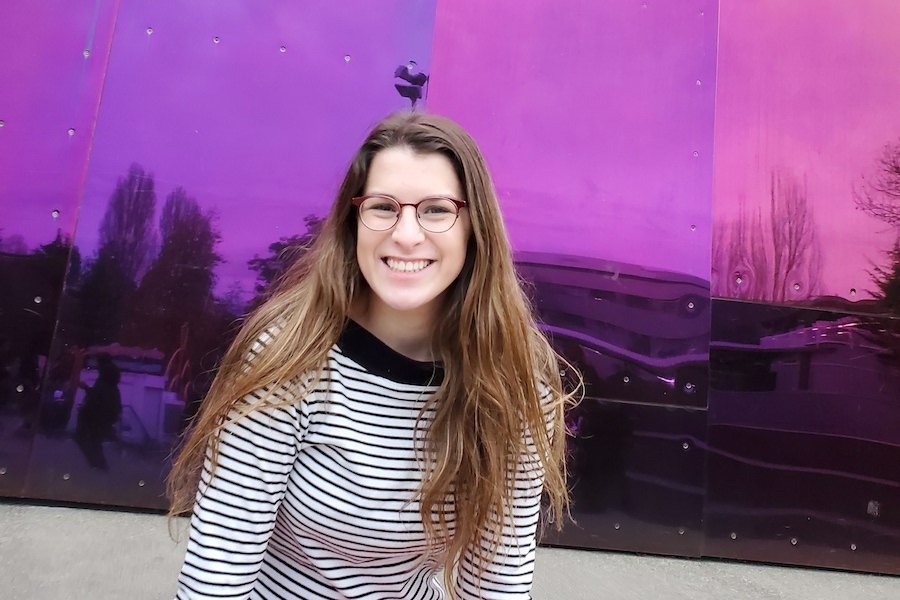Meghan Cahill finds herself and her people in CSE

Photo credit: Meghan Cahill
Senior reflects on a journey of research and DEI efforts
April 27, 2021
It might be a menial task to some, but Meghan Cahill will never get sick of pipetting liquids. That’s how much the College of Science and Engineering senior loves research. Cahill, who is studying chemistry with minors in math and communications, discovered her affinity for science in high school while doing a project on how rain acidity affects plant growth.
“I grew up somewhere where agriculture is a staple of the community, so the impact of acid rain is super relevant to my neighbors and friends,” said Cahill, a recipient of CSE’s E. Reuben and Gladys Flora Grant Scholarship. “That’s when I decided, I wanted to go into chemistry.”
Cahill’s collegiate career is underscored by her involvement in leadership, research, and advocacy—she was the first undergraduate student to join the CSE Diversity and Inclusivity (D&I) Alliance. But she said one of the best parts of her journey at the University of Minnesota was finding her own identity.
“There’s something special about the U of M and what it offers students,” she said.
“Coming here at 18, I did not know what I wanted,” she said. “What CSE gave me is this opportunity to explore so many different aspects of science and chemistry, and the groundwork to do so.”
Cahill is graduating this spring—and recently received a U of M 2021 President’s Student Leadership and Service Award. She had originally planned to go to grad school, but after feeling burnt out from “Zoom university” for the past year due to COVID-19, she hopes to work in industry first.
Bringing voices to the table
Her freshman year, Cahill nearly dropped out of school. She struggled with disabilities that made it hard for her to excel in classes and on tests. That spring, she joined the Department of Chemistry’s D&I committee.
There she met CSE Professor Edgar Arriaga, who was thinking about organizing a grassroots, college-wide alliance to further D&I efforts. Cahill immediately jumped onboard. The CSE D&I Alliance was officially formed in 2019.
“As a person with disabilities, this institution, this environment, and this college are not designed with my success in mind,” she said.
“I cannot change the entire University, but what I can do is work on things in my department, and creating things like the Alliance helps give folks with diverse backgrounds the opportunity to have their voices at the table,” Cahill said.
Now, Cahill helps lead the Alliance’s education and professional development subcommittee. Her main focus has been integrating “D&I moments,” or short conversations about equity and inclusion issues at the beginning of meetings, into teams and offices throughout CSE. This year, Cahill received a Department of Chemistry Diversity and Inclusion Award and the University’s President’s Student Service and Leadership Award for her efforts.
Her work helping fellow students also extends to her job as a Community Advisor (CA) in University residence halls, where she’s spent the past three years working with first-year students and making sure they have the support they need.
“Freshman year is one of those years where you have your highest highs and your lowest lows,” Cahill said. “It has been such a joy for me to get to be a part of so many students’ journeys. You get to help them figure out who they are and what they want to do and find their community and their people.”
Real-world impact
Undergraduate research is also a big part of Cahill’s college journey. She works in chemistry Professor Christy Haynes’ lab, which is affiliated with the National Science Foundation’s Center for Sustainable Nanotechnology.
Cahill’s main focus is toxicology. She looks at different nanomaterials—for example, those used in car batteries—and how they impact bacteria and microorganisms in the environment. Since her freshman year, she has been a co-author on five academic papers.
“What I learned in class is the theory of science, and what I learned in the research lab was actually how to do science,” Cahill said. “I’m only an undergraduate, and I’m actually doing research that is novel and unique and learning things that we didn't know previously.”
“It’s incredible to see that work matter and to be at an institution that really values undergraduate research,” she added.
She loves the people she works with in the lab—and how much they enjoy what they do.
“I think that there’s this reputation that research is hard and you have to work all the time,” she explained. “To get to be surrounded by so much brilliance and joy and talent has been really great. It gives me confidence that I can continue to have joy in my career.”
Cahill wants to eventually get her Ph.D. But for now, she’s taking a break from school. She hopes to get a job related to sustainable agriculture in the government sector after graduation.
“Agriculture is a huge contributor to climate change, and yet you can't get rid of it,” she said. “We need food and we need this industry. So what I really want to do is work around making agriculture more sustainable and making sure that we have healthy and safe food that doesn't come at the cost of destroying the planet.”
Story by Olivia Hultgren
If you’d like to support students at the University of Minnesota College of Science and Engineering, visit our CSE giving page.
